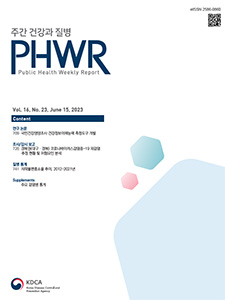Current Issue
Vol.16 No.23, June 15, 2023
-
Original Articles 2023-06-15
 5
5
 3446
3446
 691
691
Development of Health Literacy Index for The Korea National Health and Nutrition Examination Survey
Junghee Yoon, Juhee Cho, SooJin Kang, Kyungwon Oh, Sunhye Choi, Yukyeong Kang
Public Health Weekly Report 2023; 16(23): 709-725 https://doi.org/10.56786/PHWR.2023.16.23.1 Abstract
AbstractThis study aims to develop an evidence-based, reliable, and valid health literacy index to evaluate health literacy levels among Korean adults for the Korea National Health and Nutrition Examination Survey collected by the Korea Disease Control and Prevention Agency. The index was developed over two phases and six, from January to August 2022. In the first phase, we defined the conceptual framework and generated the following items: 1) domains and item generation based on a conceptual framework, 2) content validity test with 18 experts in Delphi surveys, and 3) qualitative interviews with the general public (n=20) for content validity. In the second phase, we select and finalize items: 4) cognitive interviews (n=8) of the selected item for general understanding of the questionnaires; 5) a cross-sectional survey (n=1,041) for item reduction and validation. After 6) several rounds of reviews by and discussions with experts, ten items were selected for the final health literacy index: 3 items for disease prevention, 1 item for health promotion, 4 items for health care and 2 items for technology and resources. The index demonstrated good internal consistency (overall Cronbach’s α=0.87; 0.72–0.78 for subtotals) and validity. This health literacy index can be used nationally to monitor the level of health literacy of the community and provide insight into health equity and national policies and strategies in the future.
-
Surveillance Reports 2023-06-15
 0
0
 3357
3357
 362
362
The Suspected SARS-CoV-2 Reinfection Rate and Risk Factors in Daegu-Gyeongbuk Region
Seongju Choi, Chungmin Park, Hanul Park, Yeon Haw Jung, Myung-Jae Hwang, Taejong Son
Public Health Weekly Report 2023; 16(23): 726-740 https://doi.org/10.56786/PHWR.2023.16.23.2 Abstract
AbstractThe Daegu-Gyeongbuk has experienced an upsurge in cases of SARS-CoV-2 reinfections that have been attributed to the Omicron. In preparation for implementing preventative and control measures against reinfections, a study was conducted to analyze the incidence of suspected SARS-CoV-2 reinfections and the associated risk factors among patients with coronavirus disease 2 019 (COVID-19), reported in Daegu-Gyeongbuk, from January 20, 2020, to December 31, 2022. The suspected SARS-CoV-2 reinfection rate in the region was 3.25% from the first suspected case in May 2021 until December 30, 2022. Notably, during the final four weeks of 2022 (4–31 December), the suspected SARS-CoV-2 reinfection rate increased to 13.60%. The study results indicated that the 6–11- and 12–17-year age groups (i.e., school students) had 1.65 times and 1.96 times higher risk of SARS-CoV-2 reinfection, respectively, compared with that in the 18–49-year age group. The at-risk elderly population, aged 60 years and above, also demonstrated a 1.19 times higher risk of SARS-CoV-2 reinfection than that in the 18-49-year age group. Additionally, the risk of SARS-CoV-2 reinfection decreased by 58% for fully vaccinated individuals, 40% for those vaccinated with the first booster, and 51% for those vaccinated with a third booster, compared with the risk in unvaccinated individuals. In conclusion, this study underscores the importance of regular administration of COVID-19 vaccines that have been modified according to the variants for school-aged children and elderly individuals aged 60 and above.
-
QuickStats 2023-06-15
 0
0
 3434
3434
 537
537
Trend in the Rate of Chewing Difficulties, 2012–2021
Public Health Weekly Report 2023; 16(23): 741-742 https://doi.org/10.56786/PHWR.2023.16.23.3

pp. 287~325
Most Keyword
?
What is Most Keyword?
- It is the most frequently used keyword in articles in this journal for the past two years.
Most Read
-
Management of Technology Development Efforts to Enhance the Healthcare Establishment’s Infection Response Capabilities
Misuk An, Hyeyoung Lee, Se-Jin Jeong, Hojin Lee, Sunkyung Baek
Public Health Weekly Report 2026;19: 1-12 https://doi.org/10.56786/PHWR.2026.19.1.1 -
Status and Future Tasks of the Regional Infectious Disease Specialized Hospital Establishment Project for Responding to Large-scale Emerging Infectious Disease Crises
Jeong-won Yeom, Hae-won Cho, Ju-hong Kim, Jong-hee Choi
Public Health Weekly Report 2026;19: 13-28 https://doi.org/10.56786/PHWR.2026.19.1.2
Editorial Office
+82-43-719-7569





 Full Text
Full Text Cite
Cite


